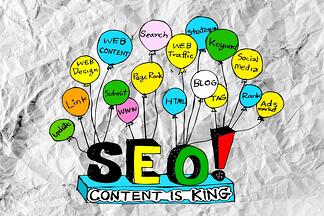 Raise your hand if you’ve ever had a client ask you, “Why am I not ranking on Google?” It’s a question that we’ve all been asked at least once throughout our career, and sometimes it’s almost impossible to answer. Google is constantly changing their algorithm, and usually, we don’t know that it’s happening until after it’s already happened. SEO isn’t getting any easier for marketers, but clients still have the desire to rank at the top of search engine results.
Raise your hand if you’ve ever had a client ask you, “Why am I not ranking on Google?” It’s a question that we’ve all been asked at least once throughout our career, and sometimes it’s almost impossible to answer. Google is constantly changing their algorithm, and usually, we don’t know that it’s happening until after it’s already happened. SEO isn’t getting any easier for marketers, but clients still have the desire to rank at the top of search engine results.
During INBOUND 2014, I had the opportunity to attend a session by Rand Fishkin, Founder of Moz, about SEO tactics to love and leave. I didn’t know what to expect seeing as I’ve read countless articles about SEO tactics, and I’ve always left feeling even more confused. However, I left Fishkin’s session feeling inspired and ready to take action. According to Fishkin, SEO has changed in the past five years. Here’s how:
Ranking algorithms are more complex
SEO used to involve adding keywords to your website pages in as many places as possible, but today, old school SEO tactics don’t work. Ranking algorithms by Google and other search engines are far more complex than ever before, and there are hundreds of different factors that influence where a website ranks. Five years ago, if you typed in “national area with lemurs Madagascar,” your results would include websites that include those keywords. Today, your results would reflect what you intended on searching for – in this case, the Ranomafana National Park. Keyword matching has now become intent matching.Google is shortening the searcher’s path
Type in “NFL scores,” “Fort Myers population” or “things to do in Fort Myers.” The first results in Google aren’t even webpages. They’re quick results that Google has compiled, meaning users don’t even need to visit a website to get the information they’re looking for. So what does that mean for us as marketers? Short term, it means that it’s getting harder to show up in search engine results. However, in 2013, there were nearly 6 billion search queries a day, and this number is only going to grow. In the long term, we’ll have more opportunities to get our websites found and ranking on Google and other search engines.It’s getting harder to measure and improve SEO
As marketers, we rely on data to help us grow and improve. However, disappearing data is making SEO more challenging to measure. If you’ve been in any analytics tool lately, such as HubSpot or Google Analytics, you’ve probably looked to see what keywords people are searching for when they come to your website. And you’ve probably been disappointed to notice that most keywords are listed as “unknown keywords (SSL).” On average, 87.25% of keywords from Google are now “not provided.” Additionally, an experiment from Groupon showed that up to 60% of traffic reported as “direct” may be organic search. Disappearing data and skewed traffic reports makes it more difficult for us to know where to focus our efforts.Good SEO is no longer just SEO
In 2004, SEO primarily consisted of keywords, rankings, crawl and links. Today, these four tactics are only a small portion of SEO. Great SEO now consists of a multitude of tactics including webspam, mobile, PR, email, localization, speed, content, social media and more. As marketers, it’s our job to choose the tactics that marry our strengths to our opportunities. No one tactic is going to be right for everyone, but it’s essential that we’re aware of our potential arsenal.Some SEO tactics should be left behind
During his session, Fishkin was quick to remind us that engaging in old school, manipulative SEO tactics is becoming more and more dangerous. However, he gave us three points to keep in mind for 2015:- Google AdWords isn’t enough: People love AdWords due to the instant gratification of traffic and results. AdWords isn’t as comprehensive as it used to be, and you may be missing keyword opportunities. Tools such as keywordtool.io. will grab all search data and suggest keywords for you.
- “Good, unique content” isn’t enough: The path to SEO greatness involves more than creating “good, unique content.” This phrase doesn’t truly represent the need of the content creator or the consumer. Sure, your content needs to be one-of-a-kind, but it needs to have a purpose in order to appeal to your customers.
- Building links for yourself isn’t enough: Here’s the truth: Google doesn’t want to count links that you’ve built yourself. They want to build links that you’ve earned. Fishkin suggests relationship building as opposed to link building.
 Impulse Creative
Impulse Creative